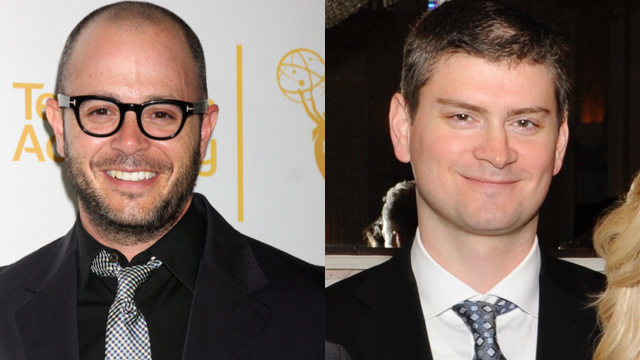Showrunners Mike Schur & Damon Lindelof Just Set the Bar for Admitting Complicity & Making Hollywood Better

When we talk about sexual harassment and assault, we often talk about the role of men in the fight against these things. What can men do besides just, you know, not harassing and assaulting women? How can they stand up for women? How can they resist being complicit cogs in the nonstop misogyny machine?
These are far from easy issues to tackle, but showrunners Mike Schur (The Office, Parks & Recreation, Brooklyn Nine-Nine, The Good Place) and Damon Lindelof (Lost, The Leftovers) did their best to address them at the Vulture Festival in LA this weekend.
After the New York Times published the accounts of Louis C.K.’s victims, Mike Schur tweeted out an apology for his own complicity in C.K.’s history of abuse.
I don't remember when I heard the rumors about him. But I'm sure it was before the last time he was on Parks and Rec. And that sucks. And I'm sorry.
— Ken Tremendous (@KenTremendous) November 9, 2017
He commented on those tweets at Vulture Fest, saying “The biggest problem is the weird, creepy, awful behavior, but one of the contributing problems is that no one ever talks about it.” And not only do producers, showrunners, and the like not talk about these things, but they continue to support and advance the careers of abusers. For everyone involved, silence is protection, and it’s a form of permission to keep doing what they’re doing.
Schur explained, “I wrote what I wrote, which is very minimal in this landscape, because it’s how I felt. I honestly don’t remember when I first heard the rumors, but I knew for a fact that I heard them before the last time he came on the show. And so in my own reckoning of my own behavior, my own past, I’m like, ‘I didn’t say anything. I’m complicit, just like anyone else is.’ So I felt like that sucked, and I wanted to say that I was sorry, whatever that amounts to, which isn’t much.”
(Note: The quotes in this article are compiled from three different transcripts, which have minor discrepancies.)
Lindelof also laid out a huge problem that stands between a lot of men and their own accountability.
“The real hard, deep dive that we all have to do is that a lot of men, particularly white men in positions of power in our business, look at themselves as the exception to the rule. ‘I’m the good one. I’m well-intentioned. I’m not part of the problem, I’m part of the solution.’ But I think this starts with a deep dive on yourself and your past behavior and if you’re writing in a writer’s room, when are you making people uncomfortable. How conscious of whether everybody is laughing at the joke or laughing because you’re the boss?”
It’s not easy to take stock of your own potentially toxic or even abusive behavior, but Lindelof shares a perfect example of his own past mistakes. A while back, Justin Theroux stans took note of a scene from The Leftovers in which you could see a distinct outline of his genitals through his sweatpants. It became a talking point in interviews, framed as a salaciously fun pull quote. Theroux laughed it off, maybe genuinely or maybe because that’s just what we’re trained to do–men as well as women–rather than treat sexualization and harassment as serious issues. But Lindelof continued talking about it, making jokes about it.
He realizes now that that was totally inappropriate, and he’s since apologized to Theroux. He says, “I never asked, ‘Justin, is this cool?’”
It’s so heartening to hear two prolific, powerful men not only admit and apologize for their own mistakes (with actual apologies, not PR scrambles–the kind that come from genuine remorse and a desire to do better) but layout clear and practical steps for change.
Lindelof’s advice: “Start with the premise that you are part of the problem.” For showrunners, specifically, he urges “not to be overly simplistic about it. Build a culture through representation. Don’t have a writers room that’s dominated by white dudes. Create parity … You’ll start to build a culture where that shit is not going to happen anymore.”
Mike Schur had some similarly necessary advice: “You wanna talk about how to self-correct. Build shows around nice people. Don’t build a show around Charlie Sheen.”
(via Vulture, THR, Pajiba, featured image: Shutterstock, Wikimedia Commons)
Want more stories like this? Become a subscriber and support the site!
—The Mary Sue has a strict comment policy that forbids, but is not limited to, personal insults toward anyone, hate speech, and trolling.—
Have a tip we should know? tips@themarysue.com